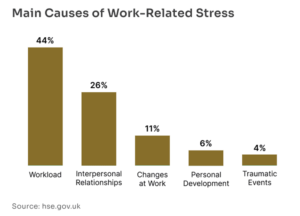Be Aware of Today’s Workplace Stressors … 7 insights on how to build resilience to them
Nov 9th, 2022

This week is International Stress Awareness week and its theme is ‘Working Together to Build Resilience and Reduce Stress’. As leaders, we have a responsibility to manage this both for ourselves and the team around us.
Key to building resilience and reducing stress is actually understanding what is causing the stress in the first place. Recent research from the HSE found that workload is the biggest cause of work-related stress among British workers. This is true of many of my clients who are under-resourced and are finding recruiting in this market challenging. Managing increased workloads while working on new tenders, inducting new team members and managing client expectations is adding additional stress.

There are common causes of workplace stress that appear to be prevalent at the moment. Below are seven causes, along with some initial ideas on how to manage them in order to help build resilience to them and reduce their impact.
1. The return of work travel
Travelling for business stopped completely for most people during the pandemic, and it has taken a while for it to fully return.
Several clients report that this increase in travel has caused different stresses for them. One is away for a number of days a week and finds that whilst she is away, her work piles up. She is unable to do existing work whilst travelling and always returns with more work to do. Another client is on a plane a few times a week and this is causing conflict in his private life. When he returns home he is tired and wants to finish any outstanding work and then rest, but his family wants to take advantage of the time he is home to do things together. He is aware that this is unfair to his family and he needs to find a balance.
Top tip: Being smart with structuring your time and diary management is key. Even though delegation may appear another time costing activity, unless you develop team members there will always be a dependency on you. One client in a global professional firm has focused on developing a No.2 and assisting him to build client relationships so that clients are equally happy to deal with him. Structure team development as a priority – half an hour a week is a good start.
2. Managing Generation Z
Every new generation that enters the workplace brings their own success and challenges and recently I have had a number of discussions with leaders and business owners who are conscious of how they are managing the expectations of team members in their twenties.
Many are ambitious and achieving great results, however, leaders report their surprise at the short-term expectations some have regarding their next career promotion. This creates stress when trying to balance the desire to retain and reward the best talent, with maintaining parity within the workplace and managing sensible progression.
Top tip: Businesses need to avoid falling into the trap of rewarding short-term success and ambition, rather than development and results. Clarity about the culture during the induction period setting out the timescales, targets and criteria for promotion and pay rises can help manage this as team members know there is a clear process in place. Professional services firms are very good at doing this. The larger firms usually have one or two rounds of promotions each year and staff members know that the appraisals and feedback process drives the decision-making for each round.
3. Cost of living crisis
Many business owners I have spoken to recently have talked about the stress levels caused by the responsibility they feel towards employees in helping them to manage the cost of living crisis. Whilst being very aware that the cost of running their business is also increasing.
According to a survey conducted by PwC of companies employing over 250 staff, over 80% of them were planning to support staff through the cost of living crisis, with the majority looking at providing additional financial help through pay increases and one off bonuses. Many large organisations such as John Lewis, Sainsbury’s, Tesco and Aviva have also introduced schemes to help staff reduce their daily cost of living by increasing staff discounts, providing free meals at work or subsidising travel costs.
A client recently sang the praises of an apprentice within their organisation who was hungry to learn and recognised the opportunity she was given in a global organisation. When a close colleague who was doing a similar role left for a higher salary, she chose to stay even though she too had been approached. She did not ask for an increase and focused on learning as much as possible and succeeding in her role. The company recognised her loyalty and her contribution, so reviewed with her where she wanted to go within the organisation and created a bespoke learning programme for her, which also came with a significantly increased salary. Her loyalty and integrity was rewarded and her commitment to contribute and succeed is even higher.
Top tip: According to a study by Reed.co.uk, one in three workers are considering moving jobs for a higher salary due to the cost of living crisis. Retaining staff during an ‘employee’s market’ can be stressful for employers who want to maintain stability and continuity. Providing financial perks to employees isn’t necessarily an option for many SMEs, but regular engagement with team members to work on a path for progression and to discuss other allowances, such as late starts and early finishes to reduce the need for childcare costs, is easy to do. It is also important to reward loyalty and provide longer term incentives for staff who are approached but choose not to leave.
4. Ambition and balance – managing different personal roles
Stress in the workplace often stems from people not having found the right balance between their ambition and what makes them happy. We all undertake different roles at work and at home and we need to work hard on balancing them.
A client I was working with had become a new father two years ago and took pride in being a hands-on parent who shared the day-to-day responsibilities with his partner. He was excited to have been offered a promotion at work that he had worked very hard for, but the fact that it would involve travel and longer hours meant he was worried about how it would impact his parental duties.
Another had been offered a new role in a different country, which would have meant relocating, but after careful consideration decided to put home life ahead of career progression. When I asked him what success looked like for him, he reported that he would be able to answer that question easily within a work context, but recognised he had not had this important conversation with his wife about what constitutes success for his family.
Top tip: It is important to step back and look at what your priorities are. You need to know what success looks like at home as well as work and have open conversations with partners about what is and isn’t going to work for you and them.
5. Distance discrimination
For many who have embraced the benefits of flexible working, there is a growing concern that not being in the office full-time is going to impact their opportunities for career progression.
Lots of my clients work with their own international clients and therefore work in multiple time zones with early morning and late evening calls. At one company the owner has decided to allow his team to take responsibility for their own working hours without stipulating the days they need to be in the office. This means that rather than working UK hours with extended hours for morning calls to the Far East and evening calls to the US, team members are able to factor those calls into their daily working hours. It doesn’t make the call times any more sociable, but it does mean they can be flexible and free up other times during the day where they don’t have to work.
The MD of a commercial property consultancy makes a point of not being in the office for every team meeting. She reasoned that when she was sat around the boardroom table, it was natural for her to have more engagement with her colleagues who were in the same room as her, but when she joined remotely, there was more emphasis on involving those who were on the video screen.
Top tip: Leaders create their own culture, so if your business has decided to allow flexible working as an ongoing policy, then it is important for the leadership team to demonstrate that those who spend less time in the office are not going to lose out to colleagues who are in the office more regularly. Simple measures such as having regular meaningful one-to-one conversations with team members; putting in place performance measures based on clear deliverables and changing the meeting culture can make the workplace more inclusive for those working flexibly.
6. The importance of peer relationships
A client recently spoke of absorbing the pressure of senior management expectations while protecting his team and motivating them during uncertain times. I asked him who he could speak with that might be sharing the same issues and he acknowledged there were very few people that he felt he could be vulnerable within his workplace. We spoke about the value of peer relationships – not only do you gain value from their advice, you often are able to contribute to resolving their problems which makes you feel good.
Top tip: Build a support team around you including trusted peers. A problem shared is a problem halved and the clarity that comes through processing your thoughts with a trusted confidante can help put perspective on issues and reduce stress. Everyone needs support.
7. Take care of you
The saying ‘put your own oxygen mask on first’ is so true. It is easy to neglect the basics of sleep, diet and exercise when you are under-resourced and travelling.
Top tip: Have a set of non-negotiable habits that form part of a daily routine that you enjoy – a daily walk, morning podcast, cooking. Aim for at least 7 hours of sleep each night and use the sleep well-being function on your phone to set yourself sleep times. Book a holiday or a weekend with friends – having things to look forward to can give you the energy to continue knowing you will have a well-earned break soon. Remember, if you are not your best self it is harder to motivate others to be at their best.
If these stresses sound familiar and you want to talk about how to build resilience, either for you or your team, then please do get in touch at team@potentialplus-int.com.
To learn more about what our clients have gained from our coaching we have lots of testimonials that you might find interesting.